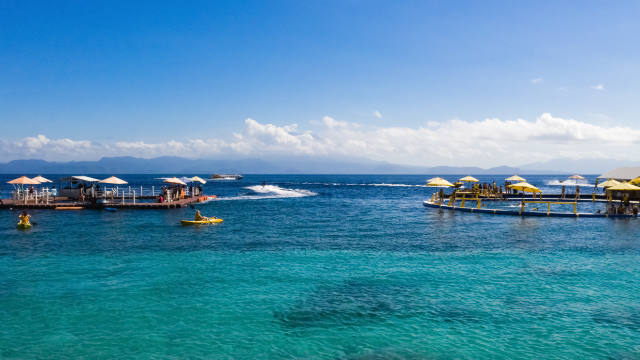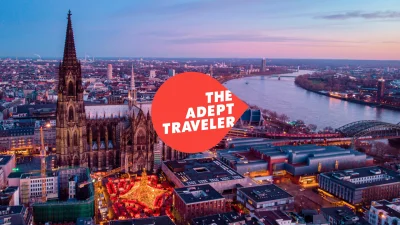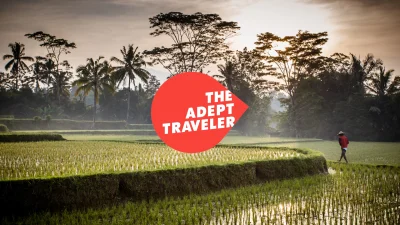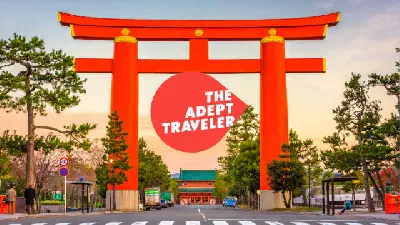Indonesia
Immerse yourself in the enchanting allure of Indonesia, a mesmerizing archipelago that beckons travelers from all around the globe. As your plane descends from the azure skies, you're greeted by a parade of mist-clad volcanoes standing sentinel over emerald rice paddies, their shadows dancing beneath a tropical sun. The bustling markets hum with life, offering a kaleidoscope of colors as vibrant as the spices that permeate the air, cinnamon and clove mingling in a fragrant symphony. Savory aromas waft from street stalls, promising savory bites of nasi goreng and satay, igniting your taste buds with their bold, irresistible flavors. The gentle crash of waves echoes along the pristine beaches of Bali, where surfers chase the perfect swell as the golden sun dips below the horizon in a blaze of oranges and pinks. Discover the biodiversity of lush rainforests, home to the elusive orangutans, whose playful chatter fills the air. Every corner of this diverse nation tells a story, from Jakarta's skyscrapers touching the sky to the ancient temples silently whispering their ancient wisdom. Travel to Indonesia and let its wonderment seep into your heart, promising memories that will inspire your soul to explore even deeper into this captivating land of diverse beauty.
Indonesia Travel Season
Travel to Indonesia is an experience rich in culture, landscapes, and biodiversity. Indonesia's geographical diversity means that the best travel seasons vary depending on the region you plan to explore. However, for most of the country, the dry season, which spans from May to September, is generally considered the best time for travel to Indonesia. During this period, travelers can expect sunny days, calmer seas, and less humidity, making it an ideal time to enjoy outdoor activities such as trekking, hiking, and diving.
Peak Travel Season
The peak travel season in Indonesia occurs during the months of July and August, as well as during the Christmas and New Year period from December to early January. During this time, travel to Indonesia is especially popular among tourists, resulting in higher prices for accommodations and flights, particularly in tourist hotspots like Bali, Jakarta, and Yogyakarta. While the weather is usually favorable, the influx of visitors means that attractions and beaches can become crowded, and reservations for hotels and popular tours are often necessary well in advance.
Ideal Travel Times for Avoiding Crowds
For travelers seeking a more tranquil experience, the shoulder months of April, May, and September are ideal for travel to Indonesia. During these months, the weather remains pleasant with fewer crowds, allowing for a more intimate exploration of Indonesia's cultural sites and natural wonders. Prices for accommodations and flights are typically more affordable, and there's a greater likelihood of finding secluded spots on the islands' beautiful beaches.
Weather and Climate Considerations
The wet season, running from October to April, brings heavier rainfall, particularly between December and February. While some regions like Bali are popular year-round, it's worth noting that travel to Indonesia during the wet season can involve unexpected downpours and higher humidity levels. Roads may be challenging in rural areas, and some ferries could be disrupted. However, the wet season also offers its own advantages, such as lush, green landscapes and fewer tourists, making sites like the temples of Borobudur less crowded.
Local Events and Festivals
Timing travel to Indonesia with local events and festivals can provide invaluable insights into the country's rich cultural tapestry. For instance, the Bali Arts Festival, which typically occurs in June and July, showcases traditional and contemporary Balinese art performances, while Indonesia's Independence Day on August 17th is celebrated across the nation with parades and cultural events. Travelers may also find it rewarding to experience Indonesia's various religious festivals, such as Eid al-Fitr and Nyepi, each offering unique traditions and festive atmospheres.
Off-Peak Travel Perks
Traveling to Indonesia during the off-peak months also presents some unique benefits. Beyond more competitive pricing, travelers can enjoy a more authentic experience, engaging with locals and exploring less commercialized areas without the pressure of tourist crowds. Visiting destinations like Komodo Island, Lombok, or Sumatra during the quieter months allows for a more intimate connection with Indonesia's breathtaking natural beauty and cultural diversity, making travel to Indonesia an unforgettable journey.
The Weather and Seasons in Indonesia
Indonesia, a vast archipelago straddling the equator, offers a tropical climate that is truly an adventure for travel enthusiasts. When planning travel to Indonesia, it's essential to understand its climate, which is one of the primary factors defining the diverse experiences across the country's islands. Indonesia boasts a relatively consistent temperature year-round, usually between 80°F (27°C) and 90°F (32°C). The warmth is beautifully complemented by a rotation between two distinct seasons: the dry season and the rainy season. Each season offers unique experiences for travelers seeking diverse weather conditions during their travel to Indonesia.
Dry Season in Indonesia
The dry season in Indonesia typically spans from April to October, making it an ideal time for travel to Indonesia. This season is marked by pleasant weather featuring minimal rain, lower humidity levels, and constant sunshine. During these months, temperatures hover around 80°F (27°C) to 85°F (29°C), which promotes outdoor activities and exploration. The dry season provides ideal conditions for enjoying Indonesia's beautiful beaches, engaging in water sports, and embarking on island-hopping adventures. Bali, one of Indonesia's most popular travel destinations, sees a significant influx of visitors during this period due to its sunny weather and clear skies.
Rainy Season in Indonesia
The rainy season, occurring between November and March, brings significant changes to the weather pattern across Indonesia. Characterized by increased rainfall, humidity, and occasional thunderstorms, this season sees temperatures consistently around 80°F (27°C) to 86°F (30°C). Despite frequent rain showers, often heavy but not long-lasting, travelers can still enjoy many of Indonesia's cultural and scenic attractions. The lush landscapes, verdant rice fields, and vibrant flora flourish during these months, offering a different yet enchanting perspective of Indonesia's natural beauty. During this season, major events like the Nyepi Day in Bali take place, offering a unique cultural experience for those traveling to Indonesia.
Best Time to Travel to Indonesia
For many travelers planning a trip to Indonesia, the dry season is considered the most favorable time to visit. This period provides the perfect combination of optimal weather conditions, reduced rainfall, and manageable humidity, making it suitable for beach outings, trekking in the island's interiors, and exploring cultural sites. However, savvy travelers seeking a more tranquil experience might opt for the shoulder months at the beginning or end of the rainy season. These months often offer pleasant weather with fewer tourists and the benefit of off-peak travel deals.
Whether traveling for adventure, cultural exploration, or relaxation, understanding Indonesia's climate can help in crafting a more enjoyable and informed travel experience. From the idyllic beaches of Bali to the rich cultural tapestry of Java and the unspoiled beauty of Sumatra, travel to Indonesia promises something unique in every season. This enchanting nation welcomes visitors all year round, offering different charms and adventures in its warm, tropical embrace.
Accepted Payment Methods and Other Payment Information in Indonesia
When planning travel to Indonesia, understanding the diverse payment options available can greatly enhance your experience. The local currency in Indonesia is the Indonesian Rupiah (IDR), which is the primary medium for financial transactions. It's essential for travelers to familiarize themselves with the appearance of Rupiah notes and coins to facilitate smooth financial dealings during their stay.
For those who prefer using credit cards, Visa and Mastercard are widely accepted in urban areas and major tourist destinations across Indonesia. Many hotels, restaurants, and shops readily accept these cards, making them convenient options for travelers. However, it's worth noting that American Express and Discover cards are less commonly accepted, with acceptance largely limited to high-end establishments. Travelers are advised to check in advance whether their chosen payment method is accepted to avoid any potential inconveniences.
Despite the growing popularity of electronic payments, cash remains a dominant form of payment, especially outside city centers and in rural areas. Travelers should plan to carry a reasonable amount of cash when traveling beyond major cities in Indonesia, as smaller businesses often prefer or only accept cash payments. ATMs are widely available in urban areas, and international travelers can withdraw cash in rupiah using their foreign bank cards, although it is wise to inform your bank of your travel plans to prevent any service interruptions.
Understanding tipping etiquette in Indonesia is also a valuable part of travel planning. While tipping is not mandatory, it is appreciated in service industries such as restaurants, hotels, and for drivers. A tip of 5-10% is generally considered generous and thoughtful in these services. Some upscale restaurants and hotels may include a service charge, so checking the bill before adding a tip can be helpful.
Mobile payment solutions like GoPay, OVO, Dana, and ShopeePay have gained traction as convenient payment methods. Travelers from regions where these services are available may find it beneficial to download these apps and use them for everyday transactions. However, it’s advisable to stay informed about security measures and currency conversion rates to ensure a smooth and secure experience.
When traveling in Indonesia, it’s also useful to be aware of potential network issues that might affect card transactions in more remote areas. Therefore, keeping both cash and card options readily available can enhance flexibility and resilience while exploring Indonesia’s diverse locations. Awareness of different payment options and limitations contributes to a more enjoyable travel to Indonesia. Maintaining a balanced approach to using cash and digital payments allows visitors to navigate comfortably through their Indonesian adventures.
Why You Should Travel to Indonesia
Indonesia offers a kaleidoscope of adventures for every type of traveler. Whether you’re seeking cultural immersion, awe-inspiring nature, or unique urban experiences, every aspect of this archipelago nation promises something special. Whether you're planning to travel to Indonesia for the first time or returning to discover new gems, you'll be captivated by its diverse offerings.
Rich Cultural Tapestry
Travelers to Indonesia will encounter a rich cultural mosaic woven from hundreds of ethnic groups and languages. From the vibrant Batik fabric-makers of Yogyakarta to the timeless rituals of the Torajans in Sulawesi, there's no shortage of opportunities to engage with the country's diverse cultural heritage. Each island boasts its own unique traditions, which are often celebrated through colorful festivals and ancient ceremonies, making travel to Indonesia a deeply enriching experience.
Stunning Natural Landscapes
Indonesia's natural beauty is simply breathtaking, with landscapes ranging from the terraced rice fields of Bali and the lush jungles of Sumatra to the idyllic beaches of the Gili Islands. Home to some of the world's most impressive volcanoes, such as Krakatoa and Mount Bromo, travelers are offered dramatic vistas and adventure opportunities like nowhere else. These landscapes make travel to Indonesia a visual and physical adventure.
Unrivaled Marine Biodiversity
For travelers who are diving or snorkeling enthusiasts, Indonesia is an underwater paradise. Raja Ampat, the coral reefs of Komodo National Park, and the waters off Bali offer an astonishing array of marine life. The diversity of fish species, colorful coral, and unique underwater landscapes invites you to explore the world beneath the waves when you travel to Indonesia.
Indonesian Culinary Delights
Indonesia’s cuisine reflects its broad cultural diversity, with each region boasting its own specialties. From the savory rendang of West Sumatra to the spicy sambal of Java and the fresh seafood of Sulawesi, food lovers will find a world of flavors to discover. Street food markets and traditional warungs offer the chance to taste authentic dishes where ingredients and techniques are steeped in history. Travel to Indonesia to indulge in these unforgettable culinary experiences.
Warm and Welcoming Locals
Indonesia's people are known for their hospitality and friendliness. The warmth of the locals makes travel to Indonesia especially inviting for travelers who appreciate genuine human connections. Whether you're invited to join a local ceremony or simply catching up with a vendor in a bustling market, the interactions will add a layer of authenticity to your trip.
Fascinating Wildlife
Travel to Indonesia for a chance to encounter wildlife that is both unique and diverse. The Komodo dragon, orangutans in Borneo and Sumatra, and exotic bird species offer unforgettable wildlife experiences. Indonesia's national parks and wildlife reserves provide travelers with the opportunity to see these incredible creatures in their natural habitats.
Spiritual Exploration
From the majestic temples of Borobudur and Prambanan in Java to the spiritual heartland of Ubud in Bali, travelers can explore Indonesia's spiritual depth. These sacred sites offer a glimpse into the country's religious practices, deeply rooted in Hinduism and Buddhism as well as Islam, Christian, and local beliefs, making travel to Indonesia a soul-enriching journey.
Vibrant City Life
The cities of Indonesia, such as Jakarta and Surabaya, showcase a dynamic blend of modernity and tradition. Travelers can experience the energetic nightlife, bustling shopping districts, and a thriving art scene. Urban exploration in Indonesia reveals a side of the country pulsating with growth and cultural fusion.
Adventure Opportunities
For those seeking adrenaline-pumping activities, travel to Indonesia offers endless possibilities. Surf the legendary waves of Bali, hike through the jungles of Kalimantan, or venture on a rafting trip down the Ayung River. Adventure enthusiasts have a multitude of choices that cater to all levels of thrill-seeking.
Budget-Friendly Destination
Travelers will find that Indonesia is an affordable destination without compromising on experience quality. With options for every budget, from luxurious resorts to backpacker-friendly hostels, travel to Indonesia can be tailored to fit economical plans. The good value extends to food, transport, and adventures, making it accessible to a wide array of travelers.
The History of Indonesia
Indonesia, an archipelagic nation of over 17,000 islands, offers history enthusiasts a rich tapestry of events, cultures, and architectural marvels spread across centuries. When you travel to Indonesia, you step into a vibrant past that dramatically shaped the Southeast Asian region. Early settlers of Indonesia were the Austronesian people who arrived around 2000 BCE. These settlers laid the foundations for complex societies that evolved long before the Western world had any significant exposure to this part of Asia. Throughout its vibrant history, Indonesia embraced a myriad of influences—from Indian to Chinese, Islamic to European—that have synthesized into the diverse culture it exhibits today.
Among the notable historical landmarks that fascinate travelers, Borobudur stands out as a breathtaking 9th-century Mahayana Buddhist temple. Located on the island of Java, Borobudur is the world's largest Buddhist temple and features an extensive array of stone carvings and stupas. Its design, a narrative in stone, illustrates the journey toward enlightenment, drawing visitors not only for its beauty but as a spiritual pilgrimage site. Meanwhile, the Prambanan Temple Complex, a UNESCO World Heritage site, serves as a testament to the Hindu influence in Indonesia. This complex of towering, intricate shrines dedicated to Shiva, Brahma, and Vishnu, is proof of the rich yet obscure Hindu empires that once dominated the archipelago.
As you travel to Indonesia, Jakarta, the pulsating heart of the nation, offers insights into the more recent history formed under colonialism and independence. The Dutch East India Company established Batavia (now Jakarta) in the 17th century, making it a centerpiece of trade routes and colonial administration in the region. Exploring Jakarta's Old Town, with its colonial architecture and museums, bridges a narrative from the times of colonial oppression to the vibrant modern metropolis that is now the center of Indonesia's growth and democracy since its independence in 1945. The National Monument (Monas) in Jakarta is another significant structure symbolizing Indonesia's fight for independence and national pride.
Cultural heritage in Indonesia is as diverse as its geography, with each island presenting a unique blend of traditions, languages, and crafts. Bali, known as the Island of the Gods, attracts travelers with its Hindu culture, spectacular temple architecture, and traditional dance forms. Meanwhile, the cultural vibrancy of the Toraja and Batak in Sulawesi offers a view into indigenous ethnic traditions, with elaborate funeral rituals and intricate woodcarvings. The weaving art of the Lesser Sunda Islands and the distinct Batik craft from Java also offer art enthusiasts a window into the centuries-old practices that continue to thrive today. Therefore, a journey through Indonesia is not just a travel experience but a deep dive into a tapestry of historical and cultural tales that promise to leave a lasting impression on any history lover.
The Culture of Indonesia
Indonesia is an archipelago nation brimming with a mosaic of cultures that lure travelers from every corner of the globe. One of the most captivating aspects of Indonesian culture is its rich tradition, rooted in diverse customs and indigenous beliefs. From the island of Java with its intricate shadow puppet theater, known as Wayang Kulit, to Bali's vibrant temple festivals, Indonesia offers a diverse tapestry of cultural experiences. For those who travel to Indonesia, engaging with these traditions is not just an option but a remarkable journey into the heart of human expression and spirituality. The locals, with their warm hospitality, invite travelers to participate in these festivities, making it a participatory experience rather than a mere spectacle.
The festivals in Indonesia are truly a feast for the senses. Nyepi in Bali, for instance, is a day of silence meant for introspection, followed by a spirited parade known as the Ogoh-Ogoh, which features colossal demonic sculptures. In Java, the Waisak festival lights up the night with thousands of lanterns at the Borobudur Temple, attracting seekers of cultural enlightenment. Another must-experience event is the Toraja Funeral Ceremony in Sulawesi, which, despite its somber connotations, is a vibrant tapestry of music, dance, and community gatherings. These festivals showcase the diverse beliefs and harmonious coexistence of Indonesia’s unique cultural landscape, making travel to Indonesia an experience that is as educational as it is enchanting.
The daily customs of the Indonesian people are equally fascinating. From the casual discussions over a cup of kopi, or coffee, to the diligent practice of batik making — an art form recognized by UNESCO as a Masterpiece of Oral and Intangible Heritage of Humanity — Indonesian culture is imbibed with creativity and community. Daily markets burst with life, selling everything from exotic fruits to meticulously crafted shadow puppets, reflecting the intricate mix of tradition and commerce that defines the Indonesian way of life. Visitors who travel to Indonesia often find themselves enraptured by these communal gatherings, where kindness and smiles are the common currency.
Indonesia's multiculturalism is one of its most precious assets. The country is home to over 300 ethnic groups, living harmoniously while still retaining distinct cultural identities. This blend of influences is beautifully expressed through various art forms such as the Saman dance from Aceh, which utilizes a synchronized group movement, and the gamelan music that orchestrates the sounds of Java and Bali with mesmerizing rhythms. In response to globalization, there have been robust cultural preservation efforts, especially concerning indigenous populations like the Dayak in Borneo and the Dani in Papua, who continue to uphold their ancestors' customs and traditions. As travelers immerse themselves in the diverse cultural landscape of Indonesia, they witness firsthand the intersection of ancient traditions with modern sensibilities, making travel to Indonesia an unmissable adventure for the culturally curious.
The Culinary Experience of Indonesia
Travel to Indonesia promises a vibrant and unforgettable culinary journey that reflects the nation's rich cultural tapestry. Indonesian cuisine is a delightful amalgamation of indigenous flavors and diverse external influences, ranging from Indian and Chinese to Middle Eastern and European. This multifaceted heritage translates into an exceptional variety of dishes, each boasting unique and robust flavors. The use of aromatic herbs and spices such as lemongrass, galangal, and turmeric is particularly prominent, infusing dishes with unforgettable tastes and vibrant colors. The culinary scene in Indonesia extends far beyond your typical dining experience, drawing in travelers who wish to immerse themselves in the heart and soul of the country's gastronomic tradition.
One cannot travel to Indonesia without sampling nasi goreng, the quintessential Indonesian fried rice, often served with a fried egg on top. Another must-try dish is rendang, a rich and spicy beef stew that owes its tender, flavor-intense character to hours of slow-cooking coconut milk and spices. Travelers with less adventurous palates might enjoy satay, skewered and grilled meats served with a sweet and spicy peanut sauce. Beyond mainland favorites, Indonesia's numerous islands offer a vast palate of unique seafood dishes, notably the aromatic mixed seafood-rich otak-otak enveloped in banana leaves. Vegan and vegetarian travelers in Indonesia can savor dishes like sayur lodeh, a coconut milk-based vegetable soup, or enjoy tempeh, a protein-rich soy product that originated in Indonesia and can be found in various preparations throughout the country.
Indonesia also offers a vibrant array of beverages to accompany its cuisine. While the country is predominantly Muslim, limiting the production and consumption of alcohol, travelers can still explore locally made wines and spirits such as brem, a traditional Balinese rice wine. Moreover, the locally brewed Bintang beer is a refreshing complement to spicy dishes, appreciated by many visitors. For those who prefer non-alcoholic drinks, Indonesia entices with an array of fresh fruit juices, herbal jamu, and exotic coffee, notably the world-famous Kopi Luwak, made from beans processed by civet cats. These drinks contribute to the memorable flavors and aromas encountered when you travel to Indonesia.
Dining experiences in Indonesia are as diverse as its cuisine, from bustling street-side stalls to contemporary fine dining restaurants. Travelers can explore vibrant food markets such as Jakarta's Jalan Surabaya, where delicious street food can be savored while soaking in the local atmosphere. In Bali, the culinary scene has exploded with high-end dining destinations offering innovative takes on traditional Indonesian dishes. Food festivals, such as Ubud Food Festival in Bali, attract foodies from around the globe who come to taste seasonal specialties and learn about the country's culinary arts. Traveling through Indonesia offers not just a feast for the belly but also a deeper understanding of how its varied culinary traditions tell the story of the nation's history, customs, and unity in diversity.
What to See and Do in Indonesia
Travel to Indonesia and immerse yourself in the heart of the Southeast Asian archipelago, a place that strikes a perfect balance between lush landscapes, vibrant cultures, and adventurous experiences. This diverse country beckons travelers with its promise of both relaxation and excitement, offering something for everyone, from thrill-seekers to history buffs and family vacationers. As you plan your journey, consider these incredible experiences that truly capture the essence of Indonesia.
Bali's Enchanting Rice Terraces
Venture into the interior of Bali, where the verdant beauty of the island is at its most striking. The Tegalalang Rice Terraces, with their ingeniously designed Subak irrigation system, offer a glimpse into traditional Balinese agricultural practices. Walking through these terraces provides travelers with a serene and reflective experience, the vibrant green fields stretching as far as the eye can see. Families and solo travelers alike will find themselves refreshed by the tranquil beauty of these ancient landscapes.
Komodo National Park: Home of Dragons
For those interested in wildlife, a visit to Komodo National Park is an unmissable adventure. Recognized as a UNESCO World Heritage site, this park is the only place in the world where you can see the formidable Komodo dragons in their natural habitat. Trek through rugged terrains with a guide, and get a chance to observe these incredible creatures up close. Adventure seekers will thrill at the unique opportunity to explore this remote ecosystem, home to dragons and a variety of other wildlife.
Yogyakarta's Cultural Epicenter
Discover the rich history and culture of Yogyakarta, often viewed as the soul of Java. Visit the stunning Borobudur Temple, the largest Buddhist temple in the world, which offers profound insights into Buddhist culture and architecture. Nearby Prambanan Temple, a UNESCO World Heritage site, is a testament to the region's Hindu legacy. The vibrant arts scene, traditional crafts, and welcoming local communities make Yogyakarta a cultural haven for travelers looking to delve deeper into Indonesia’s heritage.
Ubud: The Artistic Heart of Bali
Renowned as the cultural capital of Bali, Ubud invites travelers to immerse themselves in the island's artistic and spiritual life. Explore a myriad of art museums and galleries, showcasing traditional and contemporary Balinese art. Participate in a yoga retreat or meditation session, tapping into the island's spiritual energy. This experience is particularly appealing for solo travelers and creative souls seeking inspiration and peace.
Diving in Raja Ampat
For underwater enthusiasts, Raja Ampat is akin to diving in a living aquarium. Located in West Papua, this archipelago contains some of the richest marine biodiversity on earth. Experience a kaleidoscope of colors while diving or snorkeling among coral reefs teeming with an astonishing variety of fish species. This underwater paradise is a dream destination for divers and nature lovers, offering an unforgettable glimpse into the vibrant marine life of Indonesia.
Sumatra's Orangutans and Jungles
The lush jungles of Sumatra offer a distinctive travel experience, especially appealing to eco-tourists and wildlife enthusiasts. Explore the Gunung Leuser National Park, home to the critically endangered Sumatran orangutans. Engage with nature by trekking through the dense rainforest and learning about conservation efforts aimed at protecting these gentle creatures. It's a profound and educational journey, perfect for families and those passionate about wildlife preservation.
The Volcanic Majesty of Mount Bromo
No travel to Indonesia would be complete without witnessing the majestic sunrise over Mount Bromo. Located in East Java, the Bromo-Tengger-Semeru National Park offers a spectacular landscape of vast volcanic calderas. An early morning jeep tour leads travelers to the viewpoint, where the sun rises dramatically over the mist-shrouded mountains. This enchanting natural spectacle is ideal for photographers and nature lovers seeking a truly awe-inspiring travel experience.
Relaxation in the Gili Islands
The Gili Islands, located just off the coast of Lombok, are perfect for those looking to unwind in a tropical paradise. These islands, known for their pristine white beaches and crystal-clear waters, offer a range of activities from snorkeling to kayaking. The absence of motorized vehicles enhances the tranquility, making it an ideal destination for families and couples seeking a peaceful retreat. Enjoy the hospitality of the locals and soak up the laid-back island vibes.
Culinary Delights in Bandung
Indonesia’s culinary scene is as diverse as its culture, and Bandung is a city that offers a delicious journey into Sundanese cuisine. Wander through bustling food stalls and restaurants, sampling a variety of dishes like nasi goreng, satay, and gado-gado. The city is also known for its unique street food offerings, providing a delightful experience for food lovers. Whether you're a solo traveler or with a group, the gastronomic adventure in Bandung is a feast for the senses.
Jakarta's Urban Experience
As Indonesia's capital, Jakarta presents a fascinating blend of modernity and tradition. Dive into the city’s energetic urban life, where skyscrapers coexist with historical landmarks. Visit the National Monument (Monas) and the old town of Kota Tua to gain insight into the nation's history. For a taste of local culture, explore the vibrant markets and enjoy the nightlife. Jakarta is a dynamic metropolitan hub that appeals to travelers seeking the pulse of contemporary Indonesia.
Tips & Tricks for Traveling in Indonesia
Traveling to Indonesia offers a myriad of experiences, from its mesmerizing landscapes to its diverse cultural tapestry. To make the most out of your travel to Indonesia, it's vital to arm yourself with some practical tips and tricks designed to enrich your adventure in this Southeast Asian paradise.
Learn Basic Indonesian Phrases
While many locals in tourist-heavy areas of Indonesia speak English, knowing basic Indonesian phrases can significantly enhance your travel experience. Simple greetings or phrases indicating gratitude, such as "Selamat pagi" (good morning) or "Terima kasih" (thank you), go a long way in building rapport with locals. It's a mark of respect and shows your willingness to embrace their culture, often resulting in friendlier interactions, possible discounts, or insider tips about places to visit.
Use Local Transportation for Authentic Experiences
Indonesia's public transportation system can be a bit daunting initially, but it offers an authentic glimpse into the daily lives of Indonesians. Opt for traditional becak rides in Jogjakarta or catch a train through Java’s lush countryside. For island hopping, make use of ferries or speed boats. These not only help in cutting travel costs but also lend unforgettable, local experiences away from the typical tourist path.
Plan for Diverse Weather Conditions
Indonesia’s climate can vary significantly depending on the region. It’s crucial to plan your travel in Indonesia with its weather conditions in mind. The dry season (April to October) is ideal for beach and outdoor activities, while the wet season (November to March) can impact travel plans, especially in areas prone to flooding. Always have a flexible itinerary to accommodate sudden weather changes, packing rain gear and appropriate clothing.
Optimize Your Itinerary to Avoid Crowds
Many travelers visit hotspots like Bali, but traveling to Indonesia also means exploring less-trodden paths where you can escape crowds. Consider places like Flores, Raja Ampat, or the remote islands of the Banda Sea. Each offers stunning natural beauty and unique cultural experiences with fewer tourists. Travel during the shoulder seasons, just before or right after the peak tourist season, to enjoy lower prices and less congestion.
Respect Local Customs and Traditions
Respect for local customs is essential when you travel to Indonesia. Indonesia is predominantly Muslim, especially in areas like Aceh and Lombok, so dress modestly and observe local prayers times and holidays. In Hindu-majority Bali, you might witness ceremonies and traditional dances—it's respectful to dress appropriately and ask before taking photos. Showing respect for local traditions earn you warm welcomes and better travel experiences.
Bargain Sensibly at Markets
Haggling is a common practice at Indonesian markets, and it can be a fun part of shopping if done respectfully. When you travel to Indonesia, practice your negotiation skills in local markets, whether buying souvenirs, fresh produce, or handicrafts. Start by offering half the asking price, and remember that the goal is to reach a fair deal, so smile during the process and know when to agree on a price or walk away.
Savor Local Cuisine
Indonesia’s culinary landscape is as varied as its islands. Be adventurous and try street food like nasi goreng (fried rice), satay (grilled skewers), or the legendary rendang. Avoid sticking only to familiar dishes, as many delicacies can be found in local warungs (small family-owned eateries) rather than large restaurants. Embrace the communal aspect of meals to truly grasp the sense of sharing cherished by Indonesians.
Connect with the Local Community
Enhance your travel in Indonesia by joining community-based tourism programs. Such initiatives provide a genuine cultural exchange and positively impact the local economy. Participate in village tours or volunteer projects that allow you to connect with Indonesians and understand their way of life. You might learn traditional crafts, agriculture practices, or even local cooking styles from the villagers themselves.
Travel Insurance is Essential
While Indonesia offers breathtaking adventures, it's vital to prioritize safety. Obtain comprehensive travel insurance to cover unexpected events such as medical emergencies, lost baggage, or sudden changes in travel plans. While traveling to Indonesia, especially in remote regions, it's comforting to know that you can rely on insurance to ease any potential mishaps, ensuring a smoother, stress-free travel experience.
Capture the Magic with Respect
For photographers, Indonesia’s landscape is a breathtaking canvas— from majestic temples to pristine beaches. However, always seek permission before photographing people, particularly in religious settings. Be mindful not to disturb or intrude on sacred rituals and personal space. Sunrise or sunset offer the best natural lighting for photography, so plan your visits to iconic places accordingly to capture Indonesia in its best glow.
What To Know Before You Go to Indonesia
When planning your travel to Indonesia, understanding the entry requirements is crucial. Most travelers need to secure a visa before arrival. Indonesia offers a Visa on Arrival (VoA) for citizens of many countries, which allows a stay of up to 30 days. Check with the Indonesian embassy or consulate for the most current information on visa requirements based on your nationality.
Health precautions are an important aspect of your preparations for travel to Indonesia. Several vaccinations are recommended, including Hepatitis A, Typhoid, and in some cases, Japanese Encephalitis, and Rabies, especially if you plan to explore rural areas or have close contact with animals. Additionally, make sure your routine vaccinations are up to date. Travel insurance is advisable as it can cover unexpected medical expenses during your stay in Indonesia.
Local Customs and Etiquette
Understanding local customs is key when you travel to Indonesia. The country, predominantly Muslim, respects traditional and religious practices. Dress modestly, especially in rural areas and when visiting places of worship. Remove your shoes before entering homes or temples. Public displays of affection are frowned upon, so maintain appropriate behavior in public. Additionally, using your right hand for greetings, giving, and receiving items as a sign of respect is important.
Transportation Options
Getting around Indonesia can be an adventure. Various transportation options include domestic flights, which offer the fastest way to travel between islands. On the islands, especially in Bali and Java, buses, trains, and shared minivans known as "angkot" are common. Taxis and ride-hailing services like Grab are widely available in urban areas. Renting a motorbike can be a flexible way to explore, but be aware of traffic conditions and local driving rules.
Tipping Culture
Tipping is not customary across all of Indonesia, but it is appreciated in certain sectors. In restaurants and hotels, a service charge is often included, but leaving small change as a tip for excellent service is welcomed. For taxi drivers or guides, rounding up the fare or giving a small tip for good service is considered polite.
Common Phrases and Communication Tips
While Bahasa Indonesia is the official language, English is widely understood in tourist areas. Learning a few basic phrases can enhance your experience when you travel to Indonesia. "Selamat pagi" (Good morning), "Tolong" (Please), and "Terima kasih" (Thank you) are useful words to know. Use translation apps or carry a phrasebook for more complex conversations. Body language and a friendly demeanor go a long way in overcoming language barriers.
Retain these insights and enjoy a memorable experience as you travel to Indonesia, exploring its diverse cultures, rich landscapes, and warm hospitality.
Accessibility in Indonesia
Traveling to Indonesia offers a diverse range of experiences, but for those with specific accessibility needs, such as limited mobility, visual, or auditory impairments, understanding the accessibility options is crucial. In recent years, Indonesia has made strides to improve facilities for travelers with disabilities; however, there are still challenges to be aware of. This country, with its unique blend of culture, nature, and modernity, aims to welcome all travelers, despite some gaps in infrastructure for those requiring special accommodations.
Physical Accessibility
For travelers with limited mobility or who use wheelchairs, Indonesia presents a mixed landscape of accessibility. Major cities like Jakarta and Bali have started to incorporate more accessible features. For instance, some sidewalks in Jakarta have been improved with ramps and tactile paving. Hotels in tourist areas often have accessible rooms and facilities, though it's advisable to confirm with the hotel before booking. Wheelchair access is limited in many older buildings and public restrooms, so planning ahead is essential.
Visual and Auditory Accommodations
Indonesia is slowly making progress regarding visual and auditory accommodations. Some newer hotels and landmarks are equipped with visual aids and enhanced audio guides, but these are not universally available. Most major airports are equipped with visual and auditory signals to assist travelers. It is recommended for visitors requiring specific aids to research or contact service providers and attractions in advance to ensure their needs are met.
Accessible Public Transportation
Public transportation in Indonesia, particularly in Jakarta and other major cities, is gradually becoming more accessible. The TransJakarta bus system and the MRT in Jakarta have some accessible features, such as designated wheelchair spaces, ramps, and auditory signals. However, services like buses and commuter trains might not consistently offer portability aids or easy boarding processes. Ride-hailing services, which have gained popularity in Indonesian urban centers, could offer a more convenient option, especially for travelers with mobility needs.
Accommodations for Travelers with Disabilities
Most international hotels in Indonesia are aware of accessibility requirements and have made necessary adjustments. These accommodations often include wheelchair-accessible rooms, roll-in showers, and elevators. Still, options might be limited in smaller hotels or in less touristic areas. Contacting hotels directly is the best way to ensure they provide the necessary arrangements to make your stay comfortable.
Accessible Tourist Attractions
While not all tourist attractions in Indonesia are fully accessible, there are certain places known for their efforts to accommodate travelers with disabilities. The renowned Bali Bird Park, for instance, offers facilities for wheelchair users, including ramps and accessible pathways. Additionally, the Ubud Monkey Forest has taken steps to improve infrastructure for all visitors. As always, it’s advisable to contact these attractions in advance to understand their accommodations.
Travel to Indonesia for individuals with disabilities requires thoughtful planning and research, given the varying levels of accessibility across the country. With a proactive approach, visitors can enjoy the richness of Indonesian culture, history, and nature, while ensuring their travel experience is as seamless as possible.
Health & Safety in Indonesia
When planning travel to Indonesia, it's important for travelers to remain aware of several safety concerns to ensure a smooth and enjoyable trip. From beautiful beaches to bustling cities, Indonesia offers diverse experiences, but one must consider various safety aspects, including water safety, natural disaster risks, crime, and health precautions.
Water Safety in Indonesia
Water safety is a critical concern when traveling to Indonesia, especially for those looking to explore its numerous islands and coastal areas. Strong currents, riptides, and changing tides can pose risks for swimmers and surfers. It's advisable to swim in designated areas monitored by lifeguards and heed any local warnings or flags indicating dangerous conditions. Additionally, when participating in watersports, always use proper safety gear and choose reputable operators with good safety records.
Natural Disaster Risks
Indonesia is located in the Pacific Ring of Fire, making it prone to natural disasters such as earthquakes, tsunamis, and volcanic eruptions. Travelers should stay informed about the latest developments, especially if visiting areas near active volcanoes. Having an emergency plan and knowing evacuation routes can be lifesaving. Staying abreast of local news and heeding advice from local authorities is crucial during any natural disaster alert in Indonesia.
Crime Concerns
While Indonesia is generally a safe travel destination, petty crime such as pickpocketing and theft can occur, particularly in crowded areas and popular tourist sites. Travelers should be vigilant with their belongings, avoid displaying valuable items, and use well-secured bags. Be cautious of scams and always use registered taxis or ride-sharing services to minimize risks of overcharging or other fraudulent activities.
Political and Social Unrest
Travelers should also be aware of the potential for political or social unrest in Indonesia, especially during elections or major demonstrations. These occurrences are often announced in advance, allowing travelers to adjust their plans accordingly. Avoid large gatherings and stay informed via local news or government travel advisories to ensure a safe and hassle-free journey.
Health and Safety Precautions
Health precautions are essential when traveling to Indonesia. Depending on the region and current health advisories, vaccinations for diseases like hepatitis A and B, typhoid, and rabies might be recommended. Access to healthcare varies significantly, with limited facilities in rural areas compared to more comprehensive services in major cities. Travelers should consider travel insurance for medical coverage and carry necessary medications. Drinking bottled or boiled water is advisable to prevent waterborne illnesses, and applying insect repellent can help avoid mosquito-borne diseases like dengue fever.
By staying informed and taking appropriate precautions, travelers can make the most of their trip to Indonesia, enjoying its rich culture, stunning landscapes, and warm hospitality while prioritizing their safety and well-being.
Other Places You Might Like
Ubud, Bali, Indonesia - Travelers who enjoy the lush landscapes and rich cultural tapestry of Indonesia will find Ubud a haven of harmony and vibrancy. Known as the cultural heart of Bali, Ubud offers an enchanting blend of traditional Balinese culture and picturesque nature. Rice paddies stretch like emerald carpets across the valleys, while sacred temples and shrines dot the hills. It's a place where art thrives, and creativity can be seen on every street corner, appealing to those who loved the artistic and spiritual side of Indonesia.
Borobudur, Magelang, Indonesia - This UNESCO World Heritage Site is a marvel of Buddhist architecture and is one of the largest Buddhist temples in the world. Travelers who appreciated the historical and architectural splendor of Indonesia will be captivated by Borobudur’s intricate stone carvings and serene setting. The temple is best experienced during sunrise when the golden light blankets the monument, creating a mystical atmosphere that connects visitors with the spiritual side of Indonesia's heritage.
Komodo National Park, Flores, Indonesia - For those who relish the diverse and unique wildlife of Indonesia, Komodo National Park is a must-visit. Home to the famous Komodo dragons, the park offers a dramatic landscape of rugged hills, savanna, and turquoise waters teeming with marine life. Exploring the park's islands provides a sense of adventure and discovery reminiscent of Indonesia’s untamed natural beauty.
Tegalalang Rice Terrace, Bali, Indonesia - Fans of Indonesia's verdant scenery will delight in the Tegalalang Rice Terrace, which exemplifies the traditional Balinese cooperative irrigation system called subak. The iconic landscape offers a serene escape where travelers can walk through the terraces, savor fresh coconuts, and enjoy the creativity of local artisans. The tranquil beauty of Tegalalang is akin to a lush, green tapestry that showcases the harmonious relationship between the Balinese people and their environment.
Mount Bromo, East Java, Indonesia - Those who enjoyed the volcanic landscapes and serene beauty of Indonesia will find Mount Bromo a breathtaking spectacle. Part of the Bromo Tengger Semeru National Park, this active volcano stands amidst a sea of volcanic sand, creating a stark yet stunning panorama. Visiting Mount Bromo during sunrise offers an unforgettable view as mist rises from the caldera, appealing to travelers who seek a blend of adventure and natural wonder in their journeys across Indonesia.
Final Thoughts
Embark on an unforgettable journey and travel to Indonesia, where a tapestry of vibrant cultures, captivating history, and extraordinary natural beauty awaits your discovery. Whether you find yourself exploring the ancient temples of Borobudur or relaxing on the pristine beaches of Bali, Indonesia's diverse landscapes offer something for every traveler. From its bustling cities to serene remote islands, each destination promises a unique blend of experiences that enrich your understanding and appreciation of this fascinating country.
The warmth of Indonesia’s people and the richness of its traditional arts and crafts further enrich any visit, inviting travelers to delve deeper into a world where time-honored traditions meet modern-day life. As you travel to Indonesia, you'll be mesmerized by the stunning vistas of verdant rice terraces, lush rainforests, and majestic volcanoes that provide breathtaking backdrops for adventure and relaxation alike. Whether you're snorkeling in the crystal-clear waters of Raja Ampat or savoring delicious street food in Jakarta, Indonesia leaves an indelible imprint on the soul.
Consider embarking on this incredible adventure and let the wonders of Indonesia fuel your wanderlust. As a top travel destination, Indonesia offers endless opportunities for exploration, discovery, and connection, making it an ideal choice for your next vacation. So pack your bags and set your sights on a transformative travel experience that promises both excitement and serenity in one of the world’s most enchanting locales.
Aceh, Indonesia

Bali, Indonesia

Garuda Indonesia

Gili Islands, Indonesia

Java, Indonesia

Komodo Island

Lombok, Indonesia

Lumajang, Indonesia

Malang, Indonesia

Manado, Indonesia

Nusa Dua, Indonesia

Nusa Penida, Indonesia

Nusa Tenggara Barat, indonesia

Nusa Tenggara Timur, Indonesia

Sumatra, Indonesia

Surabaya, Indonesia

Ubud, Indonesia

Yogyakarta, Indonesia

Aurora 35th Sale For Antarctica Cruises, Book By Mar 31

BMKG Tropical Lows, Bali Fast Boats Face Cancellations

Bali High Waves To Disrupt Ferries December 12 to 15

Southeast Asia Floods Reshape Travel Plans

Sumatra And Thailand Floods Complicate Travel

Asia Pacific Design Hotel Openings Through 2025

Asia Floods And Cyclones Disrupt December Travel

Typhoon Risk Alters Southeast Asia December Cruise Sailings

2028 World Cruise From Miami To Athens With Azamara

Cyclone Ditwah Floods Sri Lanka And Asia Travel Routes

South Asia Floods And Cyclone Ditwah Hit Winter Travel

Southeast Asia Floods Turn Winter Beach Trips High Risk

Sumatra Floods And Landslides Disrupt Overland Travel

Mount Semeru Eruption Raises Risk For Bali Flights

Global Guardian Flags Geopolitics as Top Travel Risk

Bali Flight Cancellations After Mount Lewotobi Eruption: What Travelers Need To Know

Bali Tourist Guidelines 2025: New Rules, Levies, and Deportation Risks

Volcanic Eruption in Indonesia Grounds Flights, Disrupts Bali Travel Plans

Globus Launches New 2025 Independent Tours in Asia

Bali Imposes Tourism Tax for Cultural Preservation

50 Iconic City-Named Foods and Beverages: A Culinary Journey Around the World

Iconic City-Named Items: Authentic Souvenirs from Your Travels

Is It Safe to Drink the Water in Asia? Comprehensive Guide

Essential Power Converters for American Travelers to Asia

Best Times to Travel to Asia: Avoid Summer Crowds and Costs

